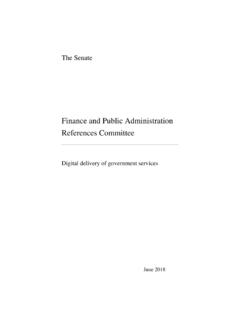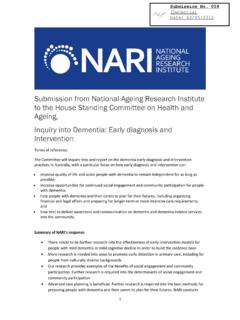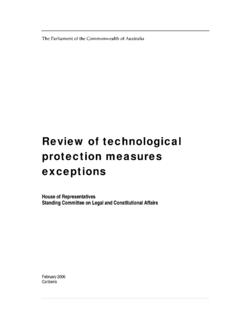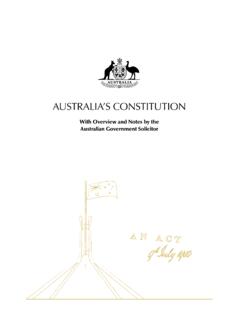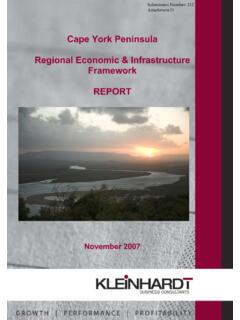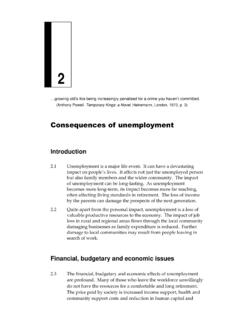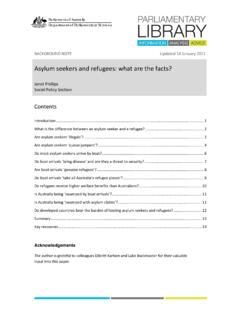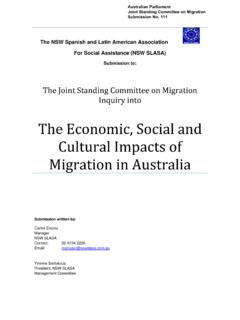Transcription of Customs Amendment (Japan-Australia Economic Partnership ...
1 Chapter 3. Key issues and committee view Key issues The committee's inquiry was focused on the provisions of the proposed legislation rather than JAEPA more generally. However, most submissions to the inquiry raised broader issues which were not matters covered by the provisions of the bills. Key issues raised included: the context to the agreement;. a range of implementation issues;. trade outcomes and tariff reductions; and rules of origin issues. Context to JAEPA. The importance of Australia establishing a bilateral trade agreement with japan was stressed in a number of submissions. For example, in the case of vegetable exports, AUSVEG observed that despite 'some favourable results from Australia's FTAs of the last decade, international vegetable market remains relatively distorted'. with 'many trading partners [having] high tariffs on vegetable imports'. It noted that while only 7 per cent of Australian vegetable production is exported 'there is growing recognition that expansion to international markets mitigates domestic market risks and increases the scope for future growth'.
2 1 AUSVEG stated: japan 's [ Economic Partnership agreement (EPA)] negotiations with Australia's competitors in the Japanese market, including the European Union (EU), Canada and China, are ongoing. Successful completion of EPA's with China, the EU and Canada will put pressure on Australia's current market share. China's generally low cost of production and subsequent price to market give the country a significant competitive advantage. Both Canada and the EU are currently Australia's main competitors in export to japan ; with comparable vegetable quality. 2. In this context, AUSVEG supported a pragmatic approach of targeting trading partners such as japan for comprehensive bilateral agreements, while slower moving, multilateral trade policy reform takes place. 3. 1 Submission 10, p. p. 2. 2 AUSVEG, Submission 10, p. 4. 3 Submission 10, p. 5. 6. In relation to beef exports, the Australian Beef Industry japan FTA Taskforce considered that 'JAEPA is critical to the long term positioning of Australian red meat, with a more liberalised import regime in japan providing a welcome boost in an environment characterised by increasing competitive pressure'.
3 4 One large beef exporter, JBS Australia, noted that 'any negotiation on improved access for Australian beef to japan was always going to be difficult'. However, it highlighted the absence of alternative paths to trade liberalisation for Australian exporters, noting that the 'WTO. Doha Round of trade negotiations has been proceeding for well over a decade and we do not see any outcomes in the near future being achieved, which are superior to the JAEPA'. 5. The Minerals Council of Australia also highlighted the importance of JAEPA. in the context of Australia's other trade agreements and relationships. It argued: No other option to JAEPA exists at this time to deepen the Australia- japan Economic relationship. Waiting for [Trans Pacific Partnership ] negotiations to conclude would be pointless, as would waiting for the conclusion of Regional Comprehensive Economic Partnership (RCEP) and Doha Round negotiations. TPP negotiations could take several more years before an agreement enters into force.
4 RCEP negotiations are at an early stage, with key decisions still to be taken on the scope and level of goods and services market access. And Doha negotiations are in limbo (again). Without JAEPA, Australia would gradually lose competitiveness in important sectors of the Japanese market. japan , like Australia, has negotiated trade agreements with several countries and country groupings, including some of Australia's competitors, and is negotiating new agreements with the European Union and Canada among others. Trade diversion would be especially damaging for Australia in areas like agriculture and services . Doing nothing also would also carry non-negligible risks for Australia's trade in minerals and energy. 6. Implementation issues A range of implementation issues were raised in submissions. These issues included: timely entry into force of JAEPA; scrutiny of implementation; education regarding JAEPA; and the infringement notice scheme. Entry into force The Department of Foreign Affairs and Trade (DFAT) website for JAEPA.
5 Notes that 'Australia and japan are aiming to complete their domestic treaty processes to allow entry into force in early 2015'. 7 A large number of submissions supported the 4 Submission 8, p. 1. 5 Submission 11, p. 2. 6 Submission 6, p. 2. 7 DFAT, 'JAEPA - Implementation timeline', available at: (accessed 21 November 2014). 7. swift passage of the bills to facilitate the rapid implementation of JAEPA. 8 For example, the Australia- japan Business Co-operation Committee commented that an 'early date of entry into force would signal Australia's welcoming of the policy shift and the long term structural reforms being initiated'. 9 Similarly, despite some concerns with JAEPA, Australian Pork considered it was important that to ensure an early entry into force and implementation of the agreement 'in order to secure maximum commercial value from the JAEPA'. 10. The potential for specific practical benefits of timely entry into force were also frequently emphasised in submissions. For example, the Australian Lot Feeders'.
6 Association urged that the bills be passed without delay. It noted: If the Bills are passed and the japan Diet also ratifies the JAEPA, there is the possibility that Australian beef will benefit from two tariff cuts next year. EIF in the period January-March 2015, for example, will deliver the first tariff cuts on beef (as above) with the second tariff cuts (1% chilled and 2% frozen) due on 1 April 2015 - coinciding with the commencement of the Japanese fiscal year. This will provide a significant preference to Australian beef over other imported product into the country. 11. Similarly, the Australian Grape and Wine Authority welcomed the earliest possible entry into force of JAEPA and highlighted that 'entry into force prior to April 2015 should guarantee two consecutive monthly reductions in the tariff rate applying to Australian bottled wine entering the Japanese market'. 12 AUSVEG also stated that '[t]he relatively early conclusion of JAEPA is reasonably expected to provide Australia with some level of advantage against other competitors in the Japanese market.
7 13. Scrutiny of implementation The Export Council of Australia (ECA) considered it important that the agreement was implemented 'in a manner consistent with the terms of the JAEPA'. 14 It was concerned that 'many of the " Customs " provisions of the JAEPA are being implemented by way of Regulations and not by the JAEPA Customs Bills, although the Regulations have yet to be made available'. While it appreciated the rationale for the use of the regulations, the ECA was concerned that the regulations have yet to be made available for scrutiny and will not made available before the JAEPA Customs Bills have passed through Parliament. 15. 8 For example, Mitsui & Co (Australia), Submission 9, p. 1. 9 Submission 6, p. 2. Also see Toyota Australia, Submission 3, p. 3. 10 Submission 4, p. 1. 11 Submission 1, p. 1. 12 Submission 5, p. 1. 13 Submission 10, p. 6. 14 Submission 12, p. 3. 15 Submission 12, p. 2. 8. The Australian Customs and Border Protection Service (ACBPS) commented: A number of provisions in JAEPA will be provided for by the making of new Regulations pertaining specifically to JAEPA and by the Amendment of the Customs Regulations 1926 ( Customs Regulations).
8 In line with Parliamentary practice these Regulations were forwarded to the Office of Parliamentary Counsel for drafting after the introduction of the JAEPA Bills in the Parliament on 29 October 2014. Under the provisions of the Legislative Instruments Act 2003 the Regulations (when agreed) are required to be registered on the Federal Register of Legislative Instruments and tabled in both Houses of Parliament for scrutiny. 16. The ECA recommended that ACBPS provide a table which refers to each of the specific provisions of Chapters 3 and 4 of the JAEPA and that also identifies where those provisions have been adopted or are proposed to be adopted whether by the bills, otherwise in the Act by the regulations or by procedure. 17 ACBPS noted that, in response to a recommendation from the Senate Legal and Constitutional Affairs Legislation Committee's report into the Korea-Australian Free Trade Agreement (KAFTA) implementation bills, it had published a table referring to each of the specific provisions of Chapters 3 and 4 of KAFTA and identifying where those provisions have been adopted whether in the Bills, in regulations or by procedure.
9 It advised that a similar table is currently being prepared for the JAEPA Agreement and will be 'available on the JAEPA web page as soon as possible after the legislative processes are finalised'. 18. Education and awareness The ECA noted research which identified that the complexity of trade agreements poses some of the most significant impediments to adoption and usage of those trade agreements. The ECA considered it was importance that the terms of the JAEPA, and the legislation enabling the JAEPA, were communicated to the trading community 'in a way which makes JAEPA readily accessible and comprehensible to those parties'. 19. It recommended that 'that an education program be developed on the benefits and access to the JAEPA to be funded either by DFAT itself or jointly with other agencies using funding from Australian and Japanese Government sources'. The ECA. believed that the program should be focussed in a way to ensure that SME importers and exporters and their service providers are best able to benefit from the JAEPA.
10 20. 16 Submission 13, p. 4. 17 Submission 12, p. 5. 18 Submission 13, p. 4. 19 Submission 12, p. 3. 20 Submission 12, p. 3. 9. ACBPS noted that it would continue to work with DFAT, other government agencies and industry to improve access to free trade agreements (FTA) by improving awareness of their scope and the requirements and processes for accessing benefits under these agreements. It stated the Australia Government would 'also keep working to reduce the complexity of these agreements by, for example, promoting greater standardisation in their language and rules, whenever possible'. 21 In relation to JAEPA. it advised: ACBPS is currently undertaking an education campaign that will provide industry with information on how to access the benefits of the recently concluded JAEPA by holding seminars in major capital cities. These seminars will be similar in content to those provided for the implementation of other FTAs, including those scheduled in this week for the [KAFTA]. The seminars are aimed at Customs brokers, freight forwarders and other professional service providers and will provide information on how to access preferential tariff treatment under JAEPA.
